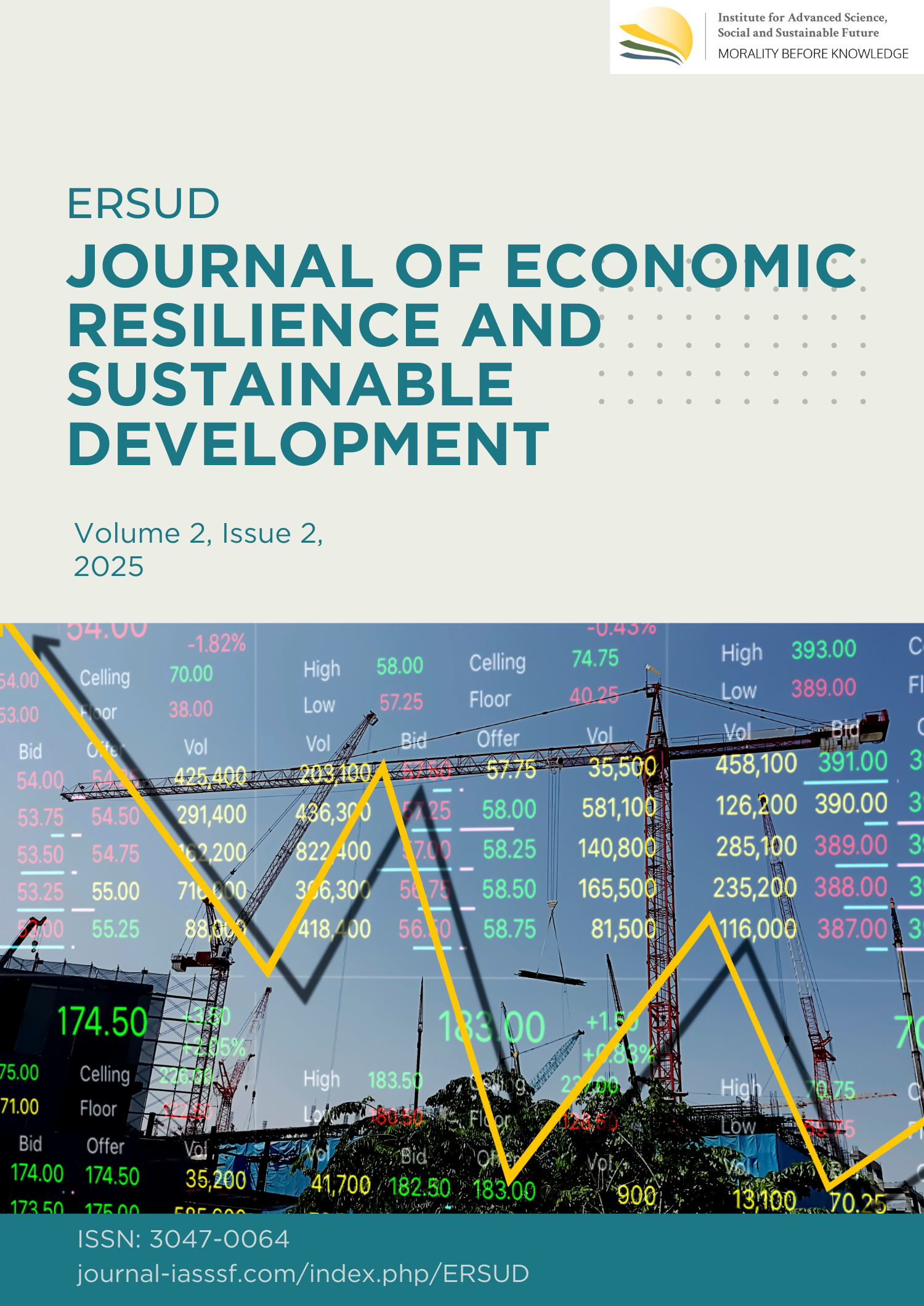Narrative policy framework analysis and stakeholder analysis on ownership policy in the banking sector for economic resilience
DOI:
https://doi.org/10.61511/ersud.v2i1.2025.1340Keywords:
foreign ownership, Indonesian Banking, economic resilience, narrative policy framework analysis, stakeholder analysisAbstract
Background: Foreign ownership policy in Indonesian Banking has been regulated by the Government through Law Number 10 of 1998 concerning Banking. Through this law, the opportunity for foreign investors to own banking shares or establish banks in Indonesia is increasingly open. The strong foreign ownership of a bank has the potential to hinder the supervision process of the bank concerned and the practice of good governance, as well as disrupt financial system stability as a whole and threaten the economic resilience of the Indonesian state. Methods: The researcher conducted an analysis by Narrative Policy Framework (NPF) analysis and stakeholder analysis on the Minutes of Meeting on the Process of Amending Law Number 7 of 1992 to Law Number 10 of 1998 concerning Banking. This research is descriptive analytical on data obtained from the results of observations, interviews, documentation, and analysis of research subjects. Findings: The results of the study indicate that the opening of opportunities for foreign ownership in changing laws is a short-term solution provided by the government. Risk analysis has shown that the scale of the risk level of foreign ownership policy up to 99 percent is at the level of medium and high risk. Stakeholder analysis shows that the Government and Parliament are parties that have a large interest and strength in foreign ownership policies in the Indonesian banking sector. Conclusion: The Government and Parliament need to review the banking laws that have been used for 21 years. The findings highlight the need for a more balanced and strategic approach to foreign ownership policies to safeguard Indonesia's financial system stability and economic resilience. Novelty/Originality of this Article: This study contributes to the limited literature on foreign ownership policies in Indonesian banking by employing the NPF to reveal the hidden narratives and political dynamics behind the legislative process.
References
Al Lawati, H., & Sanad, Z. (2023). Ownership concentration and audit actions. Administrative Sciences, 13(9), 206. https://doi.org/10.3390/admsci13090206
Bouzidi, F. M., & Nefzi, A. A. (2024). The impact of foreign bank entry on the efficiency and sustainability of domestic banks in developing countries: A meta-frontier approach. Sustainability, 16(24), 10932. https://doi.org/10.3390/su162410932
Claessens, M. S., & Van Horen, N. (2012). Foreign banks: Trends, impact and financial stability. International Monetary Fund.
Claessens, S., Van Horen, N. (2013). Impact of foreign banks. The Journal of Financial Perspectives Ernst & Young Global Financial Services Institute. 1(1). https://papers.ssrn.com/sol3/papers.cfm?abstract_id=3075974
Fang, Y., Hasan, I., Leung, W. S., & Wang, Q. (2019). Foreign ownership, bank information environments, and the international mobility of corporate governance. Journal of International Business Studies, 50(9), 1566–1593. https://www.jstor.org/stable/48686781
Graneheim, U. H., Lindgren, B. M., & Lundman, B. (2017). Methodological challenges in qualitative content analysis: A discussion paper. Nurse education today, 56, 29-34. https://doi.org/10.1016/j.nedt.2017.06.002
Jacobsen, F. F. (2012). Context and uncertainty in narratives: Stories of sickness among the Beja of Northeastern Sudan. Anthropology & Medicine, 19(3), 291-302. https://doi.org/10.1080/13648470.2011.646945
Jokipii, T., & Monnin, P. (2013). The impact of banking sector stability on the real economy. Journal of International Money and Finance, 32, 1-16. https://doi.org/10.1016/j.jimonfin.2012.02.008
Jones, M. D., Smith-Walter, A., McBeth, M. K., & Shanahan, E. A. (2023). The narrative policy framework. In Theories of the policy process (5th ed., pp. 35). Routledge.
Kasmir. (2007). Dasar-Dasar Perbankan. Raja Grafindo Persada.
Kasmir. (2010). Manajemen Perbankan. Raja Grafindo Persada.
Kim, H. E. (2005). Domestic financial liberalization, stabilizing effects of foreign bank entry, and challenges to bank supervision: The Korean experience. Bank of Korea, March. https://www.rieti.go.jp/en/events/05031901/pdf/2-1_kim_1.pdf
Krippendorff, K. (2018). Content analysis: An introduction to its methodology. Sage publications.
Kurniawan, D., Suswanta, S., Nurmandi’, A., & Salahudin, S. (2022). Mapping the Concept of the Narrative Policy Framework (NPF) on Political Studies and Public Policy. Jurnal Review Politik, 12(1), 74–92. https://doi.org/10.15642/jrp.2022.12.1.74-92
Molyneux, P., Nguyen, L. H., & Xie, R. (2013). Foreign bank entry in South East Asia. International Review of Financial Analysis, 30, 26-35. https://doi.org/10.1016/j.irfa.2013.05.004
Parikesit, S. B., & Redi, A. (2025). Preparation and implementation of government regulations in lieu of laws as a government tool to handle the economic crisis in Indonesia. Jurnal Governance, Society and Policy, 3(2). https://doi.org/10.38035/jgsp.v3i2
Perdana, A. W., & Imanullah, M. N. (2016). Kajian Pembatasan Modal Asing dalam Sektor Perbankan Indonesia dalam Rangka Pembangunan Perbankan Berdaya Saing Internasional. Privat Law, 4(1), 164485. http://jurnal.hukum.uns.ac.id/index.php/PRIVATLAWII/article/view/956
Reed, M. S., Graves, A., Dandy, N., Posthumus, H., Hubacek, K., Morris, J., ... & Stringer, L. C. (2009). Who's in and why? A typology of stakeholder analysis methods for natural resource management. Journal of environmental management, 90(5), 1933-1949. https://doi.org/10.1016/j.jenvman.2009.01.001
Rhodes, R. A. (Ed.). (2018). Narrative policy analysis: cases in decentred policy. Springer. https://link.springer.com/book/10.1007/978-3-319-76635-5
Roe, E. (1994). Narrative policy analysis: Theory and practice. Duke University Press.
Subarsono, A.G. (2010). Analisis Kebijakan Publik (Konsep, Teori, dan Aplikasi). Yogyakarta: Pustaka Pelajar.
Sudaryo, Y., & Yudanegara, A. (2017). Investasi Bank dan Lembaga Keuangan (Putri Christian. CV. Andi offset.
Susanto, R. (2019). Merger dan Akuisisi untuk Percepat Pertumbuhan. Probank No. 136 Tahun XXXVI Januari-Maret 2019.
Wijaya, I. K. (2013). Analisis kebijakan perbankan nasional. Elex Media Komputindo.
Zougris, K. (2025). Origins, styles, and applications of text analytics in social science research. Encyclopedia, 5(2), 70. https://doi.org/10.3390/encyclopedia5020070
Downloads
Published
Issue
Section
Citation Check
License
Copyright (c) 2025 Rizky Dea Alih Swasana, Adis Imam Munandar, Heru Subiyantoro

This work is licensed under a Creative Commons Attribution 4.0 International License.















